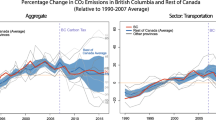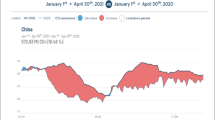Abstract
A small open economy’s optimal environmental policy is studied in a model with international capital mobility and local pollution. The country produces traded as well as non-traded goods. Is it in the country’s interest to engage in ecological dumping by choosing generous pollution allowances for the traded-good sector? The answer depends decisively on the policy regime in use. Dumping is not optimal if the country ensures that the implicit rent on pollution is completely appropriated within the country. However, if the implicit factor reward on pollution leaves the country because it accrues to (foreign) owners of mobile capital, the local welfare maximizing government tends to discriminate against the traded-good sector, the opposite of ecological dumping.
Similar content being viewed by others
References
Barrett, S. (1994), ‘Strategic Environmental Policy and International Trade’, Journal of Public Economics 54, 325–338.
Batra, R. N. (1973), Studies in the Pure Theory of International Trade. London: Macmillan.
Baumol, W. W. and W. E. Oates (1988), The Theory of Environmental Policy, 2nd edn. Cambridge: University Press.
Brander, J. A. and B. J. Spencer (1985), ‘Export Subsidies and International Market Share Rivalry’, Journal of International Economics 18, 83–100.
Conrad, K. (1993), ‘Taxes and Subsidies for Pollution Intensive Industries as Trade Policy’, Journal of Environmental Economics and Management 25, 121–135.
Cumberland, J. D. (1979), ‘Interregional Pollution Spillovers and Consistency of Environmental Policy’, in H. Siebert, ed., Regional Environmental Policy: The Economic Issues. New York: University Press.
Cumberland, J. D. (1981), ‘Efficiency and Equity in Interregional Environmental Management’, Review of Regional Studies 2, 1–9.
Jones, R. W. (1965), ‘The Structure of Simple General Equilibrium Models’, Journal of Political Economy 73, 557–572.
Kennedy, P. W. (1994), ‘Equilibrium Pollution Taxes in Open Economies with Imperfect Competition’, Journal of Environmental Economics and Management 27, 49–63.
Mayo, K. S. (1981), ‘Theory and Estimations in the Economics of Housing Demand’, Journal of Urban Economics 10, 76–94.
Oates, W. E. (1972), Fiscal Federalism. New York: Hartcourt Brace Yovanovich.
Oates, W. E. and R. M. Schwab (1988), ‘Economic Competition Among Jurisdictions: Efficiency Enhancing or Distortion Inducing?’, Journal of Public Economics 35, 333–354.
Oates, W. E. and R. M. Schwab (1991), ‘The Allocative and Distributive Implications of Local Fiscal Competition’, in D. A. Kenyon and J. Kincaid, eds., Competition Among States and Local Governments. Washington: The Urban Institute Press, pp. 127–145.
OECD (1993), ‘Environmental Taxes in OECD Countries: A Survey’, OECD Environmental Monographs, No. 71.
Rauscher, M. (1994), ‘On Ecological Dumping’, Oxford Economic Papers 46, 822–840.
Sinn, H.-W. (1994), ‘How Much Europe? Subsidiarity, Centralization and Fiscal Competition’, Scottish Journal of Political Economy 41, 85–107.
Spencer, B. J. and J. A. Brander (1983), ‘International R&D Rivalry and Industrial Strategy’, Review of Economic Studies 50, 707–722.
Umweltbundesamt (1993), Umweltabgaben in der Praxis – Ein Ñberblick. Berlin, unpublished.
Walz, U. and D. Wellisch (forthcoming), ‘Is Environmental Dumping in the Interest of Exporting Countries?’, Journal of Public Economics.
Wellisch, D. (1995), ‘Locational Choices of Firms and Decentralized Environmental Policy with Various Instruments’, Journal of Urban Economics 37, 290–310.
Wildasin, D. E. (1988), ‘Nash Equilibrium in Models of Fiscal Competition’, Journal of Public Economics 35, 229–240.
Wildasin, D. E. (1989), ‘Interjurisdictional Capital Mobility: Fiscal Externality and a Corrective Subsidy’, Journal of Urban Economics 25, 193–212.
Wilson, J. D. (1985), ‘Optimal Property Taxation in the Presence of Interregional Capital Mobility’, Journal of Urban Economics 17, 73–89.
Wilson, J. D. (1986), ‘A Theory of Interregional Tax Competition’, Journal of Urban Economics 21, 423–451.
Zodrow, G. R. and P. Mieszkowski (1986), ‘Pigou, Tiebout, Property Taxation, and the Underprovision of Local Public Goods’, Journal of Urban Economics 19, 356–370
Author information
Authors and Affiliations
Rights and permissions
About this article
Cite this article
Schneider, K., Wellisch*, D. Eco-Dumping, Capital Mobility, and International Trade. Environmental and Resource Economics 10, 387–404 (1997). https://doi.org/10.1023/A:1018337124574
Issue Date:
DOI: https://doi.org/10.1023/A:1018337124574




